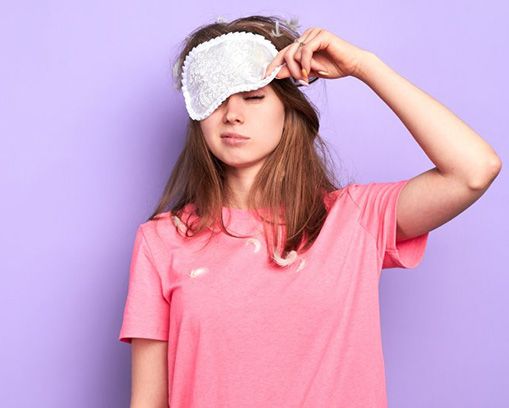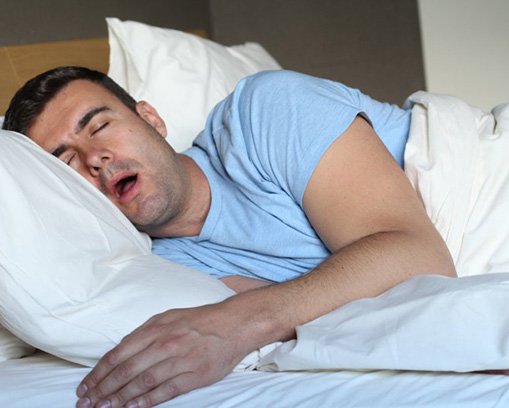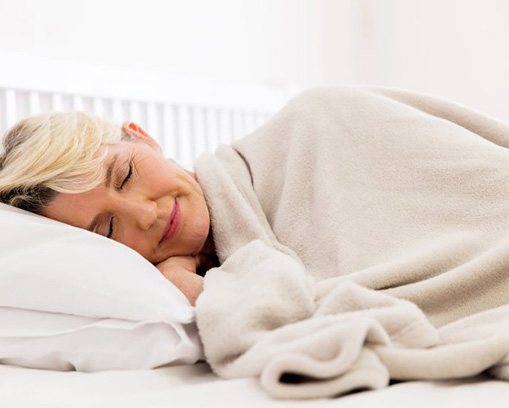Sleep Apnea Treatment—Casper, WY
Your Quick Guide to Sleep Apnea
Every morning, thousands of people in Casper wake up feeling like they never went to bed, and this is often due to sleep apnea. It’s a condition that affects about 20-22 million Americans, and it can rob someone of their rest as well as their mental and physical health. Fortunately, it is very treatable, and a proven solution can be found somewhere you might not expect…your dentist in Casper! Dr. Erin Prach is a sleep apnea dentist, and if you think that you or a loved one might have sleep apnea, you can learn more about the disorder and what can be done about it with the short guide to sleep apnea treatment in Casper, WY below.
Why Choose Dr. Erin M. Prach for Sleep Apnea Treatment?
- Dentist with Special Training in Sleep Apnea Care
- Customized Sleep Appliances for Each Patient
- More Comfortable Alternative to CPAP
What is Sleep Apnea?

When a person has sleep apnea, they briefly but frequently stop breathing several times every night. These pauses can last for up to 10 seconds and occur up to 100 times an hour in severe cases. This forces the body to partially wake up again and again to restore normal breathing, preventing the brain from completing the full sleep cycle. The interruptions are so brief that most patients don’t remember them in the morning, but they are the reason why someone can “sleep” for 7-9 hours and still wake up feeling exhausted.
There are two main types of sleep apnea:
- Obstructive Sleep Apnea (OSA): By far the most common, this occurs when the tissues in the mouth and throat collapse together during the night and block the airway.
- Central Sleep Apnea (CSA): This is a neurological issue in which the body does not send the proper signal to the body to breathe during sleep.
The Dangers of Sleep Apnea

Without treatment, a person with sleep apnea will experience:
- Chronic fatigue & exhaustion
- Increased risk for cardiovascular issues
- Rapid weight gain/trouble with weight loss
- Memory problems
- Inability to focus
- Mood swings/depression
- Increased risk of motor vehicle accidents
Sleep apnea is primarily found in men who are 40+, but it can affect any person at any age, including children. In fact, childhood sleep apnea can often lead to restlessness and hyperactivity, which is why it is often misdiagnosed as ADD/ADHD.
Sleep Apnea Treatment Options

The good news is that there are multiple treatments available for those with sleep apnea. The most popular method is CPAP (continuous positive airway pressure) therapy, in which a person wears a machine to bed that pumps oxygen into the throat to keep it open. Corrective surgery is also an option, and it is often recommended for children whose sleep-breathing issues stem from large tonsils or adenoids that are narrowing the airway.
If neither of these approaches sounds appealing, then you are far from alone. That’s why Dr. Prach is happy to offer oral appliance therapy. All a patient has to do is wear a comfortable, custom-made mouthguard to bed. It slightly repositions the jaw in order to keep the airway open, allowing the patient to get the deep, restful sleep they need night after night. This will not only improve their mental and physical health, but it can also stop persistent snoring, which can be great news for the entire family!
Sleep Apnea (Obstructive Sleep Apnea) FAQs
Does Everyone Who Snores Have Sleep Apnea?
Not necessarily. While snoring is a very common symptom of sleep apnea, not everyone who snores has this condition. To find out whether or not your snoring is related to sleep apnea, you’ll have to take an official sleep test. The test will track information such as how often and for how long you experience pauses in breathing while you sleep. It will also help you determine whether sleep apnea or a different sort of sleep disorder is to blame for your symptoms.
How Soon After Starting Sleep Apnea Treatment Will I Notice Improvement?
You should start to notice improvement with your sleep quality soon after using your oral appliance. It might take a night or two to get used to how the appliance feels in your mouth, but then you should feel quite comfortable and start to breathe easy. If your symptoms lessen and you’re more energized during the day, that’s a good sign your oral appliance is working!
Are There At-Home Remedies for Sleep Apnea?
CPAP therapy or an oral sleep appliance will ultimately make the biggest difference in your sleep quality. But there are some useful home remedies that can help alleviate sleep apnea symptoms if you’re in a pinch or are having a particularly difficult time resting.
Weighted blankets, for example, can help relax your muscles and nervous system, and are particularly effective for those with restless leg syndrome or ADHD. Wedge-shaped pillows elevate your head and can improve breathing when you’re congested. Aromatherapy has been shown to be quite effective at encouraging a sense of calm, and some evidence suggests that magnesium may be more helpful for sleep than melatonin supplements.
If you do decide to take supplements, make sure you talk to your doctor first!
How Should I Clean My Sleep Apnea Oral Appliance?
Great question – it’s important to keep your sleep apnea oral appliance clean and free from bacteria that could cause cavities or gum disease.
After taking your appliance out in the morning, gently brush them with hand soap and rinse them off. Then let them sit in their protective case. Before putting them back on at night, give them another rinse.
Instead of brushing your appliance, you may be able to let them soak in a denture cleanser, but check in with our team before using any one product. A solution that’s too abrasive could damage your appliance.
Can I Have Oral Appliance Therapy If I Grind My Teeth?
Absolutely! In fact, an oral appliance could help protect your teeth from nightly grinding and clenching. Oral sleep appliances can endure the excess strain caused by bruxism (teeth grinding and clenching), and can often relieve jaw pain just by reducing physical stress.
Rest assured, bruxism and sleep apnea tend to go hand-in-hand, and oral sleep appliances are designed with this in mind.
